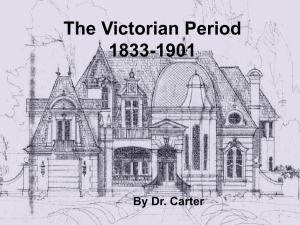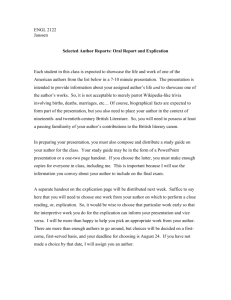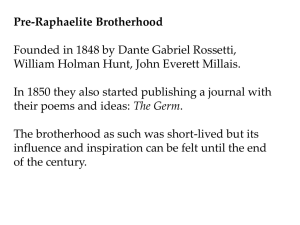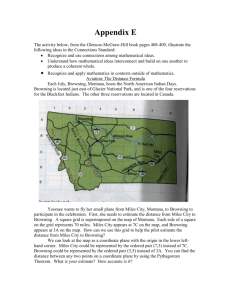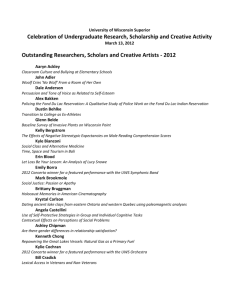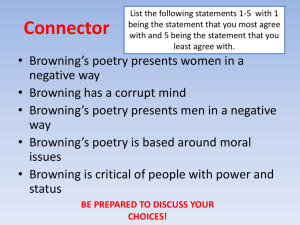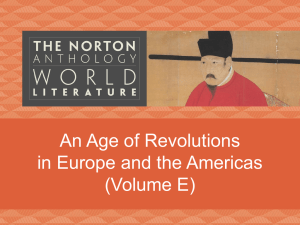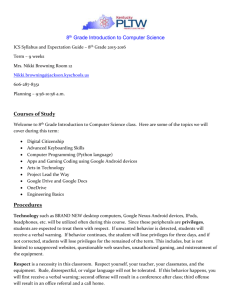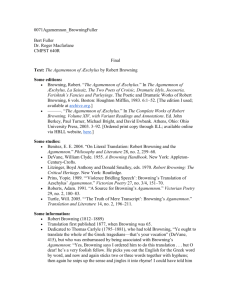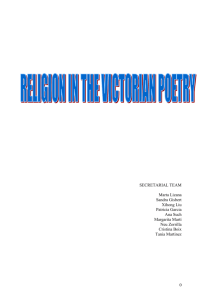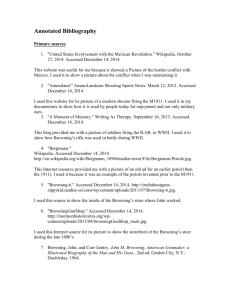ENNC 3120 VPP 15
advertisement
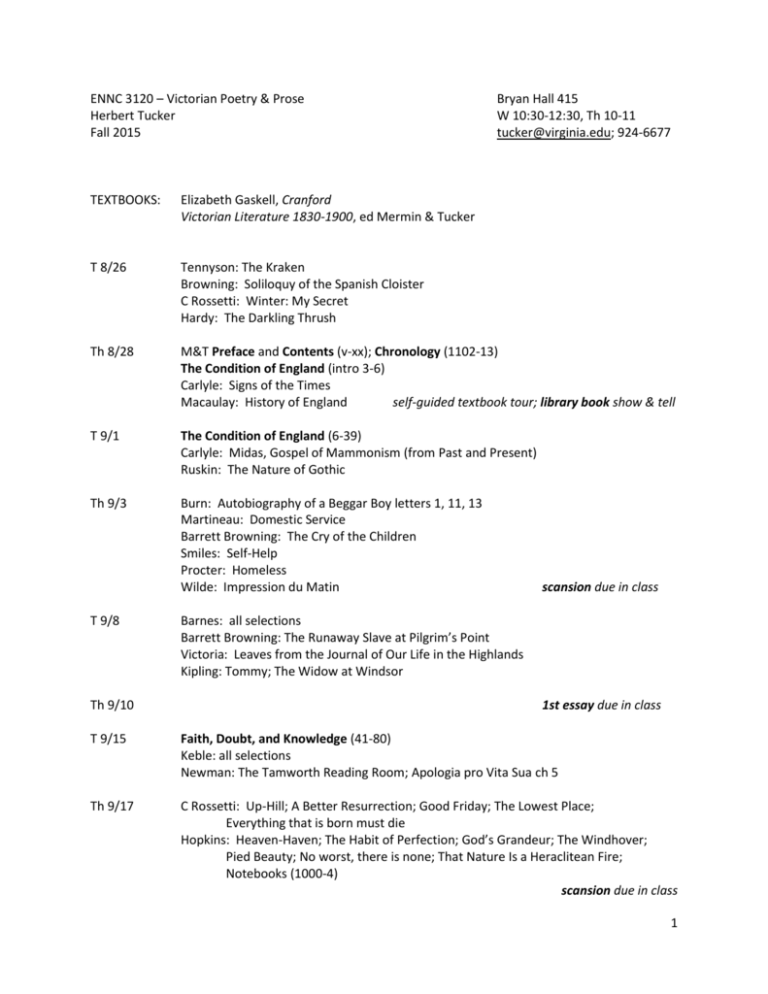
ENNC 3120 – Victorian Poetry & Prose Herbert Tucker Fall 2015 Bryan Hall 415 W 10:30-12:30, Th 10-11 tucker@virginia.edu; 924-6677 TEXTBOOKS: Elizabeth Gaskell, Cranford Victorian Literature 1830-1900, ed Mermin & Tucker T 8/26 Tennyson: The Kraken Browning: Soliloquy of the Spanish Cloister C Rossetti: Winter: My Secret Hardy: The Darkling Thrush Th 8/28 M&T Preface and Contents (v-xx); Chronology (1102-13) The Condition of England (intro 3-6) Carlyle: Signs of the Times Macaulay: History of England self-guided textbook tour; library book show & tell T 9/1 The Condition of England (6-39) Carlyle: Midas, Gospel of Mammonism (from Past and Present) Ruskin: The Nature of Gothic Th 9/3 Burn: Autobiography of a Beggar Boy letters 1, 11, 13 Martineau: Domestic Service Barrett Browning: The Cry of the Children Smiles: Self-Help Procter: Homeless Wilde: Impression du Matin T 9/8 Th 9/10 scansion due in class Barnes: all selections Barrett Browning: The Runaway Slave at Pilgrim’s Point Victoria: Leaves from the Journal of Our Life in the Highlands Kipling: Tommy; The Widow at Windsor 1st essay due in class T 9/15 Faith, Doubt, and Knowledge (41-80) Keble: all selections Newman: The Tamworth Reading Room; Apologia pro Vita Sua ch 5 Th 9/17 C Rossetti: Up-Hill; A Better Resurrection; Good Friday; The Lowest Place; Everything that is born must die Hopkins: Heaven-Haven; The Habit of Perfection; God’s Grandeur; The Windhover; Pied Beauty; No worst, there is none; That Nature Is a Heraclitean Fire; Notebooks (1000-4) scansion due in class 1 T 9/22 Mill: from On Liberty (304-9) Darwin: Origin of Species Spencer: Progress: Its Law and Cause Huxley: Evolution and Ethics Th 9/24 Carlyle: from The Hero as Divinity (182-84) Tennyson: Tithonus; Demeter and Persephone Browning: Amphibian Clough: Hymnos Ahymnos Arnold: Stanzas from the Grande Chartreuse Swinburne: Hymn to Proserpine; A Forsaken Garden Hardy: Hap scansion due in class T 9/29 Tennyson: In Memoriam Th 10/1 Browning: The Bishop Orders His Tomb; Caliban upon Setebos Brontë: No coward soul is mine Procter: A Lost Chord Hardy: In Tenebris I D G Rossetti: My Sister’s Sleep Meredith: Lucifer in Starlight Housman: Now hollow fires burn out F 10/2 2nd essay due at noon Fall Break Th 10/8 Gender and Sexuality (81-104) Martineau: Political Non-Existence of Women Mill: The Subjection of Women Darwin: The Descent of Man Nightingale: Cassandra Cobbe: Criminals, Idiots, Women, and Minors Webster: An Irrepressible Army T 10/13 Barrett Browning: Bertha in the Lane; from Aurora Leigh; Lord Walter’s Wife Gaskell: Life of Charlotte Brontë Victoria: Letters to Princess Victoria Oliphant: Autobiography C G Rossetti: In an Artist’s Studio; A Triad; Love from the North; After Death Webster: By the Looking-Glass; The Happiest Girl in the World; A Castaway Coleridge: The Other Side of a Mirror; The Witch; The White Women Levy: Xantippe 2 Th 10/15 Tennyson: Mariana; Rizpah Browning: Porphyria’s Lover; Count Gismond; A Woman’s Last Word D G Rossetti: Jenny Morris: The Defence of Guenevere Swinburne: The Leper; Hermaphroditus Hardy: The Ruined Maid Wilde: The Harlot’s House T 10/20 Barrett Browning: Sonnets from the Portuguese Meredith: Modern Love Th 10/22 Browning: My Last Duchess D G Rossetti: The Blessed Damozel Swinburne: Anactoria Field: all selections Housman: When I was one-and-twenty; Look not in my eyes Yeats: The Song of Wandering Aengus Dowson: Non Sum Qualis Eram Bonae Sub Regno Cynarae F 10/23 3rd essay due at noon T 10/27 Empire and Travel (105-130) Macaulay: Minute on Indian Education Martineau: First Sight of Slavery; The Hareem FitzGerald: The Rubáiyát of Omar Khayyám Darwin: The Voyage of the Beagle Kipling: The Ballad of East and West; Mandalay; Recessional; The White Man’s Burden Th 10/29 Tennyson: The Charge of the Light Brigade; To the Marquis of Dufferin and Ava Browning: Love Among the Ruins; An Epistle. . . of Karshish D G Rossetti: The Burden of Nineveh Hardy: Drummer Hodge Housman: 1887; On Wenlock Edge T 11/3 Barrett Browning: Hiram Powers’ “Greek Slave”; A Curse for a Nation; Mother and Poet Tennyson: Ulysses; Tears, idle tears; Enoch Arden Browning: “Childe Roland to the Dark Tower Came” Webster: Circe Th 11/5 T 11/10 Th 11/12 Gaskell: Cranford chs 1-4 Cranford chs 5-12 finish Cranford F 11/13 4th essay due at noon 3 T 11/17 The Function of Poetry (131-53) Tennyson: The Higher Pantheism Lear: all selections C Rossetti: Sing-Song Carroll: all selections Morris: The Blue Closet; The Tune of Seven Towers; Two Red Roses Across the Moon Swinburne: The Higher Pantheism in a Nutshell, Sonnet for a Picture, Poeta Loquitur Mill: What Is Poetry?; A Crisis in My Mental History (from Autobiography) Arnold: The Study of Poetry Th 11/19 Tennyson: The Eagle; Hendecasyllabics Browning: Meeting at Night; Memorabilia Meredith: Dirge in Woods D G Rossetti: The Woodspurge; Sudden Light Swinburne: The Roundel Field: Cyclamens Wilde: Symphony in Yellow Housman: Loveliest of trees Coleridge: Impromptu; L’Oiseau Bleu Yeats: He Wishes for the Cloths of Heaven T 11/24 Wilde: The Importance of Being Earnest Thanksgiving T 12/1 Clough: Amours de Voyage Th 12/3 C Rossetti: Goblin Market T 12/8 Tennyson: Maud: A Monodrama Th 12/10 Final Examination 2-5 4 Do your best to read everything far enough ahead of our meeting time that you can draw connections within and among texts, identify spots where you want help from the rest of us, and just plain think over what you’ve read, both in itself and in relation to how we live now. Keeping abreast of the reading, and opening mental space for it early in the semester, will be the best way of preparing for the final exam, which will be cumulative and will determine one-third of your course grade. The syllabus specifies four Fridays as due dates for papers, of which you must submit three. One essay should concentrate on prose, one on verse; one should center on comparison between something from a Contexts section of our anthology and something from a Major Author; one should be about 2000 words long, the other two about 1000. I read essays thoroughly for content and technique alike. Indeed, since I don’t believe content and technique are separable for long in any writing worth returning to, I record your errors, offer prose therapy inside and outside class for free, and expect you to show improvement. The paper results will together determine one-half of your course grade. One-sixth of your grade remains undetermined. I bet you noticed that already. Think of this unaccounted fraction as your incentive to make the course work as an active learning opportunity in our hours together. This may mean raising questions of your own for the group to consider, or pursuing your classmates’ proposals, or answering questions I pose from the head of the class. If you’re customarily bashful in public, this is your chance to break the shackles of custom. If you’re pathologically bashful in public, then you should find other ways – an e-mail correspondence, regular office hour visits – to show me that, and what, you are thinking about the wise or beautiful or provoking literature before us this semester. To rehearse your ideas out loud, and to practice responding to other people’s ideas in discussion, are among the best ways to extend the quality of the insights that ground your papers. But these are also skills in their own right, which this course invites you to cultivate. 5
